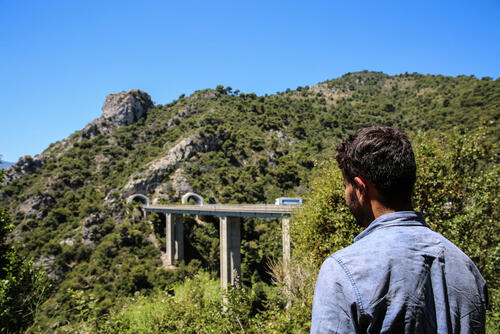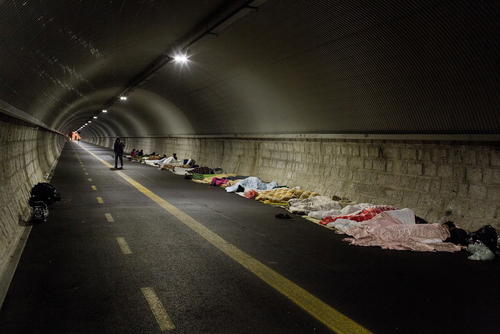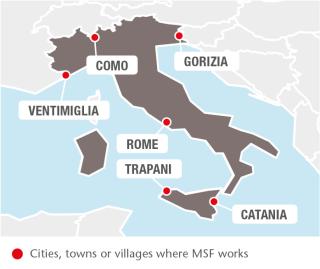
2,500
2,5
200
2
In 2017, MSF teams in Italy focused on mental health activities, specialised care for victims of violence and support for civil society initiatives for migrants and refugees.
The European and Italian authorities stepped up their efforts to stem the arrival of migrants and refugees in Europe at all costs in 2017, leaving many exposed to violence and arbitrary detention in Libya. Despite these cynical efforts, 119,396 migrants and refugees have arrived on Italian shores, mainly disembarking in Sicilian ports.
Although this number is smaller than in previous years, the Italian reception system is still struggling to respond to their specific needs. Most people are hosted in temporary emergency reception facilities, but more than 10,000 live in informal settlements, either because they are trying to reach other European destinations or because they are excluded from the official system.
MSF monitored the humanitarian needs of those living in informal settlements around the country and had volunteers working within occupied buildings in Bari and Turin, seeking to reduce the residents’ marginalisation by facilitating their access to healthcare and other services.
Sicily and southern ports
For the third consecutive year, MSF was present at the arrival points, providing psychological first aid to survivors of shipwrecks and traumatic rescues. In 2017, 21 such operations were conducted, mainly in Sicily, Calabria and Campania. In Trapani, a team consisting of a psychologist and cultural mediators offered psychological support through 1,232 individual and 116 group sessions, and assisted local services in several secondary reception centres.
Since July 2016, MSF has been running a psychotherapeutic clinic in collaboration with the local health services to treat patients with the most severe mental health problems. In summer 2017, MSF also opened a 24-hour medical centre in Catania for asylum seekers in need of care after discharge from hospital. The centre implements a holistic approach to support patients during the rehabilitation process. MSF also provided mental health support and improved water and sanitation conditions in the informal settlements where seasonal migrant workers live in the south of Sicily.

Rome
In Rome, MSF runs a rehabilitation centre for torture survivors, in collaboration with local partners Medici Contro la Tortura and ASGI. The centre has a multidisciplinary approach, providing medical and psychological support, as well as physiotherapy, social and legal assistance. In 2017, the team received 56 new admissions. The centre provides care for patients from almost 20 different countries, the majority of them victims of violence and ill-treatment while transiting Libya.
Northern borders
MSF responded to the needs of people stranded at Italy’s northern borders, with basic psychological and medical assistance, food and other donations. In Ventimiglia, at the border with France, a team of cultural mediators and a midwife ran a small clinic together with local volunteer doctors. In addition, an MSF team offered psychological first aid in the Italian Red Cross camp. In Como, at the border with Switzerland, MSF provided mental health support to migrants in transit. MSF also supported civil society initiatives with food and other donations for migrants in transit in Como, Ventimiglia and Gorizia, at the border with Slovenia.


















